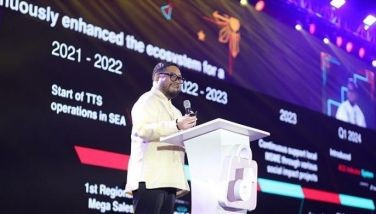Muslim women want their voices heard

Women comprise 50 percent of the population in all communities, they suffer the most in conflict, are the most marginalized in peace process engagements. They should be involved in the peace-making process, as they are mothers of young men who go to war, the daughters of fathers affected by conflict, the wives of husbands who leave to fight or lose in battles. They run from their homes and farms being bombarded by fighting forces, carrying their babies and older children in their arms, fear and anger and frustration their common lot. How can they ever live in peace?
The women’s suffering is compounded by the media’s under-recognition of their role as peace-makers, playing up instead their harrowing experiences as they flee for dear life, and their sad plight in overcrowded evacuation centers.
“The media come and visit us when there is fighting among military and rebel forces, and then we never see them again,†said a Muslim woman during a “Huntahan, Balitaan at Kapayapaan,†a dialogue between media and women from and working in Mindanao. The dialogue was organized by Isis International, a feminist NGO whose advocacy is to advance women’s rights, leadership, and empowerment in Asia and the developing world, particularly through communication. Co-organizer We Act is a national network of women peacemakers.
According to Isis organizers, in many forums and international declarations, including that of the United Nations Security Council, there is a call to recognize the critical role of women in the prevention and resolution of conflict and to increase their involvement in decision making with regard to peace and security as well as post-conflict reconstruction.
International organizations that map war and other threats to peace around the world list 50 hot spots today, from Aceh to Zimbabwe. The Isis forum organizers said the Philippine Mindanao conflict is on this list. The Philippines, however, is considered having encouraging signs of women visibly becoming active participants in the peace process. The long history of the search for a lasting peace in Mindanao, and recently, the Framework Agreement on the Bangsamoro indicate this.
Journalist Lina Sagaral Reyes, one of the women invited by Isis to the forum, said that media talk to the women in Mindanao then do not return for a follow-up. She is described as having foraged for stories among the island’s grassroots soon after taking courses at the Mindanao Peace Building Institute. “The women want to learn to write so they can write stories for the world to know their situation,†she said.
Tasneem C. Abdul Rauf is a member of the Khadija Center for Muslim Women Studies, a small group of Muslim young feminists since 2012 based in Manila that envisions establishing a study center dedicated to gender advocacy and women’s rights in Islam through research and dialogue. Our goal is to make the center known as a source for understanding women’s issues, such as women in detention, urban poor women in Manila, and women professionals.â€â€ƒâ€ƒâ€ƒâ€ƒâ€ƒâ€ƒâ€ƒâ€ƒ
Maimona Musa Didatu-Bayan, a teacher from Cotabato City, is the Central Mindanao regional secretary of Noorus-Salam (Light of Peace), a national network of Aleemat or Muslim women religious scholars and leaders, peace advocates and women organizations. She dramatically described her struggle to help the family survive by working in the Middle East, and then returning home and riding on horseback to be able to finish her studies. She teaches young pupils to study hard, believing that education is a step towards empowerment and helping empower other women.
Carmen Lauzon-Gatmaitan helped establish a Philippine-based non-government organization called the Ecumenical Commission for Displaced Families and Communities that addresses the issue of international displacement due to militarization in the country. She said women’s voices need to be heard, including issues of Indigenous People, and on ancestral domain. While women are sitting at the negotiating table now, she expressed hope that the final peace agreement signed will give important roles for women.
Although she grew up in the Middle East and now lives in Manila, and is “educated and privileged,†Amira Gotoc said she has “felt a longing to help women in my hometown in Lanao del Sur and the Bangsamoro.†This is why she developed a research organization that documents stories on how Muslim women survive in Manila.
A male participant at the dialogue, Michael Alaw of the Centre for Humanitarian Dialogue, commented on the strength of Muslim women surviving war experiences, and about the stereotyping of Muslims as being prone to violence. He gave away copies of an interesting book, Sex and World Peace, which will make an interesting topic for a future column.
* * *
Friends for Cultural Concerns of the Philippines (FCCP) put up its full-house “Fashion with a Vision 2†featuring the designs of Tippi Ocampo, Patrice Ramos Diaz and Lulu Tan-Gan. The show was inspired by the first successful fashion show last year featuring the works of Patis Tesoro, Dita Sandico Ong and Malou Veloso.
Araceli “Nene†Leonor, dynamic and fasionista FCCP president, said the organization recognizes creative designers who “have made a mark in the fashion industry here and abroad by creating attractive and exotic gowns using materials made of indigenous fibers abundantly grown in the Philippines like abaca piña, banana, and coconut. Because of the success of both fashion shows, FCCP is able to pursue its mission of promoting art and culture, particularly fashion designing.â€
Proceeds of the shows go to beneficiaries of FCCP programs, such us supporting talented needy scholars to schools and cultural groups’ presentations here and abroad, and outreach programs that expose high school students to various skills in the arts.
Rose Marie B. Lazaro, FCCP vice president and director- in-charge, said FCCP’s encouragement of designers using local fabrics will establish the Philippines as an emerging center of fashion and “may well be the legacy of FCCP whose members are not only fashion conscious but also imbued with love for our country and for our own unique culture.â€
* * *
You can see, from a kilometer away, the friendly face of Jollibee on giant billboards. And, a few meters closer, because of the delicious smell in the air, you just have to stop for a plate of Chickenjoy, a mouth-watering Yum-burger or Champ hamburger or Jollibee spaghetti. That’s how addicting Jollibee products have become.
Jollibee is the largest fast food chain in the Philippines, operating a nationwide network of over 765 stores. It enjoys the lion’s share of the local market that is more than all the other multinational brands combined. It has expanded outwards — with 87 stores in the US, Vietnam, Hong Kong, Saudi Arabia, Qatar, Kuwait and Brunei.
Celebrating its 35th year, Jollibee proudly claims the honor of being tops in commemorating family togetherness. This, according to Albert Cuadrante, the company’s vice president for marketing. Says Albert: “We encourage everyone to make family their top priority and make every moment with their family count.†It’s no wonder the long queues of customers at the stores’ counters consist of family members of all ages — from grandfolks to parents to toddlers.
Tony Tan and his family 35 years ago founded Jollibee, beginning as an ice cream parlor, and later growing into a global brand. Its family-oriented approach to personnel management has made Jollibee capture the Employer of the Year Award from the Personnel Management Association of the Philippines, Best Employer in the Philippines Award from Hewitt Associated and a top 20 Employer in Asia citation from the Asian Wall Street Journal.
* * *
Email: [email protected]
- Latest
- Trending

























